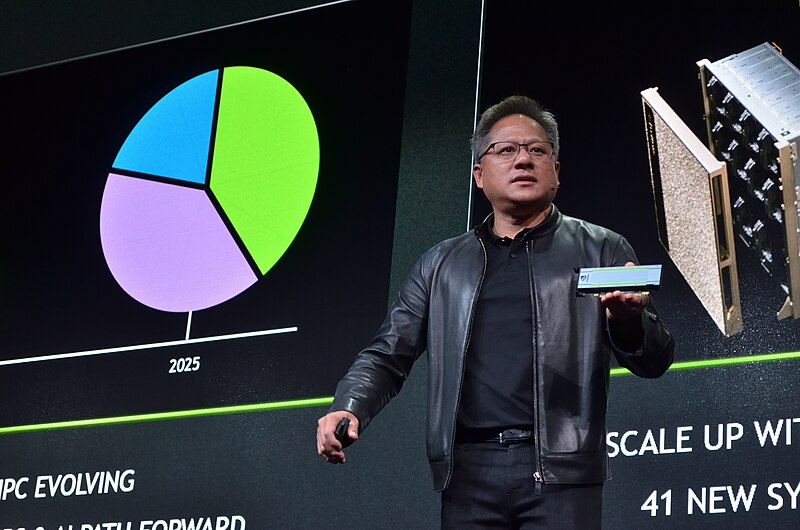TAIPEI, Taiwan — Nvidia CEO Jensen Huang praised President Donald Trump’s decision to roll back key Biden-era restrictions on artificial intelligence (AI) chip exports to China, calling the previous policy a “failure” that cost U.S. companies billions in lost sales.
Speaking Wednesday at the Computex technology conference in Taipei, Huang said the export controls introduced under former President Joe Biden were based on the “fundamentally flawed” belief that the U.S. was the sole source of cutting-edge AI technology.
“All in all, the export control was a failure,” said Huang, whose company dominates the global AI chip market. He noted that Nvidia’s market share in China had plummeted from 95% in 2021 to 50% today due to the restrictions. “Chinese companies are very, very talented and very determined,” he added, saying the curbs had fueled domestic innovation and state support within China.
Under Biden, the U.S. implemented a multi-tiered export control system aimed at curbing China’s access to advanced semiconductors due to national security concerns. But critics—including leading U.S. tech executives—argued that the controls risked undermining America’s own tech leadership by shutting out a massive, fast-growing market.
The Trump administration announced last week that it would rescind parts of those restrictions and introduce a new framework. Huang praised the move as a “great reversal,” applauding Trump for rejecting what he called the “AI diffusion rule” and recognizing the urgency of maintaining U.S. competitiveness.
“He sees it very clearly that the race is on,” Huang said. “If the United States wants to stay ahead, we need to accelerate our diffusion, not limit it, because somebody else is more than happy to provide it.”
Huang also highlighted the scale of China’s AI ambitions, estimating that the country will command a $50 billion AI market by next year and noting that it is home to half of the world’s AI researchers.
Nvidia recently disclosed that it would take a $5.5 billion write-off on its H20 AI chips, which were designed specifically to comply with U.S. export rules for the Chinese market — only to be hit with new restrictions under Trump’s revised policy.
“I really do hope that the U.S. government recognizes that the ban is not effective and gives us a chance to go back and win the market as soon as possible,” Huang said.
Huang, who accompanied Trump and other tech leaders on a recent trip to the Middle East, emphasized the need for the U.S. to expand — not constrain — its role in global AI development.
Meanwhile, Beijing has sharply criticized Washington’s evolving export policies. China’s Ministry of Commerce on Monday accused the U.S. of “seriously undermining” recent progress on mutual tariff reductions, calling the export restrictions a “typical example of unilateral bullying and protectionism.”
The ministry warned it would invoke China’s anti-foreign sanctions law against entities enforcing the new U.S. guidelines, which also threaten penalties for foreign companies using advanced Chinese chips—such as Huawei’s Ascend—without U.S. licenses.
The Economist Intelligence Unit estimates China’s state-led investment in chip development has surpassed $150 billion over the past decade.



